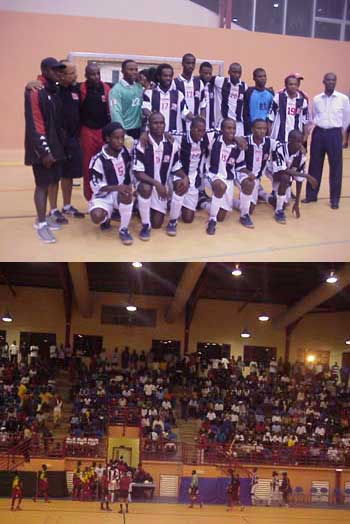28/04/2004
Caribbean Football Union Futsal Tournament
 On Friday 23 April 2004, Trinidad and Tobago was crowned champion of the inaugural Caribbean Football Union futsal tournament after defeating Guyana 5:0 at the Sport and Physical Education Centre of the University of the West Indies in Trinidad. The final, a tense and exciting affair, was played before a large, partisan crowd of some 2,000 fans, culminating a week of action involving eight teams. The tournament served as CONCACAF’s Caribbean region preliminary qualifying competition for the Confederation’s final tournament, to be played in San Jose, Costa Rica in July 2004, ahead of Taipei 2004. Three teams, the winners and runners-up, as well as Suriname, who defeated the Netherlands Antilles 9:4 in the third place match on the same evening, qualified for San Jose.
For most of the participating countries, Grenada, Guyana, the Netherlands Antilles, Puerto Rico, St. Vincent and the Grenadines, Suriname, Trinidad and Tobago and the Turks and Caicos Islands, the tournament was a first time venture into the futsal arena. Indeed, the final was disputed between two teams from countries where futsal was introduced merely months ago. This was possible only due to an initiative by FIFA in late 2003, which saw the implementation of regional futsal coaching and refereeing courses in Port of Spain, Trinidad and La Habana, Cuba. The courses, which had as one of their main objectives an increase in the number of Caribbean teams participating in CONCACAF futsal competitions, introduced five of the CFU tournament’s eight participating countries to futsal and also trained six of the eight referees on the tournament panel.
For some, such as the Turks and Caicos Islands, who lost their three matches by a 28:3 aggregate score, and St. Vincent and the Grenadines, who fielded an Under 20 team and lost their matches by a total score of 18:4, the tournament was always intended to be a learning experience – and their learning curve was very steep, indeed. Not to be disheartened, however, in their final match St. Vincent and the Grenadines defeated the Turks and Caicos Islands by 2:0. By contrast, others such as Suriname and the Netherlands Antilles, both participants in the CONCACAF final tournament prior to Guatemala 2000 and where futsal has been an established sport for the past thirty years, approached the tournament with every intention of emerging champions. Importantly, futsal neophytes Trinidad and Tobago, champions of Caribbean football on eight occasions, and Guyana, both declared similar intent very early on.
Street or informal football played on any available patch - “small goal” as it is called due to the much-reduced size of the goal - is an important aspect of popular football culture in both finalist countries. Played with rules improvised by the players, depending on the numbers available, the size of the playing area or a variety of other peculiar factors, but always grounded in Football Law, “small goal” is a passionate twelve-month past-time for players at every level of the game in both countries. The display of individual skill is a matter of personal pride for the player, which elevates his personal reputation and his community’s status. Introduced to the specifics of futsal law and tactics by FIFA instructors, Perry Gautier and Nico Spreij respectively, during a September 2003 FIFA course in Port of Spain, the national associations of both countries organized their first futsal tournaments early in 2004 and selected players for training. These players adapted quickly to the new requirements in the few months available to them and marched to the tournament final, both teams winning their group to qualify directly for San Jose.
Attack was the order of the day in Trinidad, the teams averaging 9.4 goals per match. Suriname led the way with a tournament high 36 goals, an average of 9 per match, while Guyana slammed 29 past their opponents to average 7.3 per match. By contrast, Trinidad and Tobago appeared intent on validating the old adage – “Attack wins games but defence wins titles”. Scoring a comparatively low average of only 5.5 goals per match, they conceded just 7 goals - the least in the tournament – to average 1.8 goals against per match. The majority of the tournament’s 132 goals were scored during the second half of play – 80 or 60.6% -- as the teams went after victory with their matches heading to the final whistle.
The best teams in the tournament played with a strong collective spirit, good player movement and a desire to rotate the ball. Suriname and the Netherlands Antilles, the tournament’s most experienced futsal campaigners, were difficult opponents but were undone by the sheer talent of Guyana and Trinidad and Tobago. Guyana, for their part, were the most disposed of all the teams to employ a counter-attacking tactic, being very direct in their approach once in possession. This paid rich dividends, as time and again they caught their opponents on the break. Trinidad and Tobago, however, was the most methodical outfit in the tournament, always seeking to control the pace of the game, defending as a solid unit and using the tremendous individual talent of their players with devastating effect. Led by tournament MVP Kevin Peters, a player possessed of spectacular foot skills, an eye for the calculated pass and a killer instinct in front of goal – he also finished the tournament as joint top scorer with 8 goals – the tournament hosts played with charisma and an instinctive understanding of the need to entertain while winning. Once in control of the match and the score line they always turned on the individual and collective style, to the absolute delight of the home fans. In the end, they emerged deserving champions.
The tournament now over, the challenge facing the inaugural Caribbean champions, as well as the other new-comers to futsal, is to establish the game within their national association. Plans are afoot to create futsal leagues and associations across the Caribbean, even in countries that did not participate in the tournament. FIFA will continue to assist this development with the implementation, by its Port of Spain Development Office, of two more coaching and refereeing courses in Trinidad and Cuba during late 2004.
Keith Look Loy
FIFA Development Officer
Port of Spain
|



